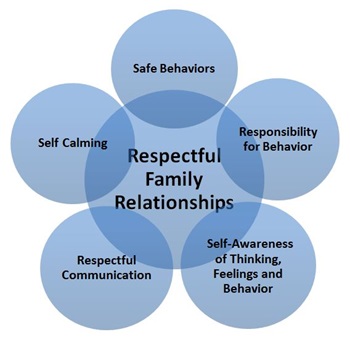Step-Up Program curriculum
The Step-Up curriculum, including manuals and workbooks, is copyrighted and requires permission of the authors to print or use. If you are interested in printing the manuals or workbooks, please request permission by contacting the program. We would like to know about your organization or service and how you plan to use the materials.
Program materials
Step-Up helps youth and parents build respectful relationships where all family members feel safe and valued. The program includes attending a youth group, parent group, and multi-family group with youth and parents together. The Step-Up curriculum is used in the groups.
The curriculum uses a skills-based approach to help teens stop the use of violent and abusive behaviors and learn nonviolent, respectful ways to communicate and resolve conflict with family members.
The facilitator manual is a guide for group leaders. It walks the leader and participants through through the Step-Up process, and includes history of the program, the authors, and restorative, evidence- and research-based practices to help youth and families.
Participant Workbooks contain guided exercises and reflections for participants in the teen and parent groups.
- Parent Workbook 3rd Edition (3 MB)
- Teen Workbook 3rd Edition (6 MB)
Curriculum overview
Keystone of the program
The Abuse of Family Members and Mutual Respect Wheels are a keystone of Step-Up.
The overall goal of the program is to help youth move from the abuse wheel to the respect wheel. We design the curriculum to address behaviors in each section of the wheels. This teaches skills to stop abusive behaviors and replaces them those on the respect wheel in the matching area.
The wheels are tools to help youth share and be accountable for behavior at home every week. They reflect on their recent behavior using the wheels at the beginning of each session. It helps them report to their group what they did that was abusive and respectful at home.
Youth also use the wheels to make weekly behavioral goals. They choose 1 behavior from the wheels to work on during the week. The group hears about their progress the following week.
The wheels provide a framework for talking about behavior. When a teen says, “I had an argument with my mom”, the facilitator asks, “Were you on the ‘abuse wheel’ or the ‘respect wheel’ during that argument?” If the teen was on the abuse wheel, the next question is, “How could you have talked to your mom about that and stayed on the respect wheel?”
The skills in the curriculum help teens and parents learn how to talk about problems, argue, and resolve conflict while staying on the ‘respect wheel’. Parents report that the wheels give them a new way to talk about behaviors at home. For example, a parent might say to their teen, “Can you say that again, and stay on the respect wheel?” Step-Up families get to know the wheels very well by the end of the program. These wheels are tools they can continue to use long after they leave Step-Up.
Creating skill sets
Step-Up focuses on 5 areas of skill development to build respectful family relationships:

Safe behaviors
Youth develop a Safety Plan (165KB) that includes steps to take to stay safe when they are angry and escalated. They identify their Red Flags, or warning signs. This helps them learn when they are heading toward using hurtful behaviors or words. Youth and parents work together to make a plan to take a break when conflict turns to disrespect or abuse. The Respect and Abuse/Disrespect Wheels help youth track their own behaviors at home and make goals.
Self-calming
Once teens and parents learn the skill of stepping away from conflict, they learn to self-soothe. They can then calm the physical responses and feelings of anger, frustration, and anxiety. They learn a variety of tools for self-calming and emotion regulation.
Respectful communication
Throughout the program, teens and parents learn about the meaning of respect through what it:
- Looks like
- Feels like
- Does to relationships
They learn step-by-step how to communicate with others in a respectful way. Especially when navigating a disagreement and difficult emotions. Youth and parents practice solving a problem using respectful communication and listening skills.
Self-awareness of thinking, feelings, and behaviors
Understanding the relationship between thoughts, feelings, and behavior helps youth. They can see how their unhelpful perceptions add to difficult feelings and behaviors. Youth examine their negative thinking and self-talk. They then learn how to change it to more helpful thinking that reduces their anxiety and reactivity to situations.
Responsibility for behavior
Youth in Step-Up develop skills for taking active responsibility for harm they have caused through the Restorative Inquiry process.
They talk to their parents about:
- Who their behavior effected.
- What harm was done to others and themselves.
- What they will do to repair the harm, damage or loss and make amends.
Youth also write a Responsibility Letter and Empathy Letter to a person they were violent toward. It is usually the incident that brought them to the program. They read this letter at their last Step-Up session.
 Translate
Translate

